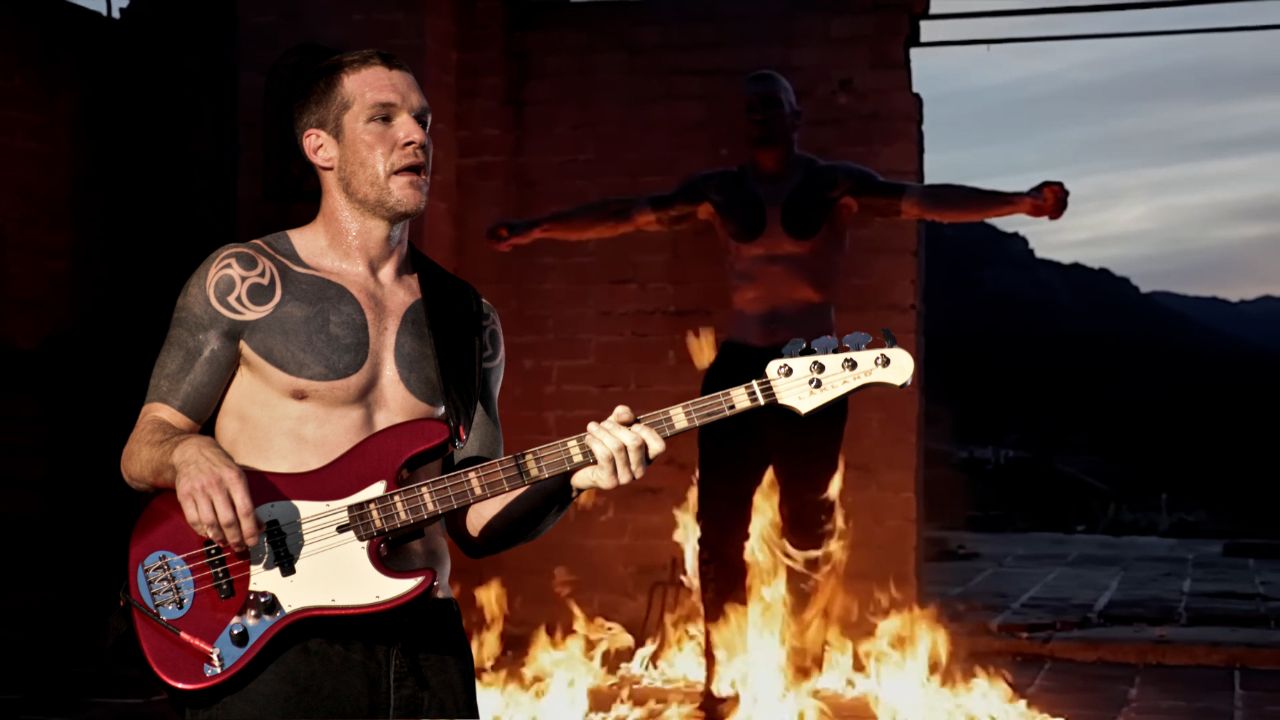
Rage Against The Machine have always faced one apparently insoluble criticism. Railing against capitalist exploitation in all its forms, from the enslavement of the masses by advertising and TV to America's foreign policy, the Los Angeles quartet made a vast sum of money for themselves by signing to a major label, Epic, and touring the world enabled by a network of music-industry corporations – the very targets of their songs.
Noticing this, many an observer remarked on this apparent ideological inconsistency, but the band – Zack de la Rocha (vocals), Tom Morello (guitar), Tim Commerford (bass) and Brad Wilk (drums) – shrugged off the naysayers with the reasonable retort that the use of major communication networks makes for a better dissemination of information. Did people listen? No.
This alone made Rage much more interesting than your average rock band, whatever you may think of their political agenda – but what is more gripping still, is that their music is rooted in the amazing basslines of Tim Commerford.

To understand Commerford's bass playing, you need to understand the man himself. In everything he does, from extreme sports to extreme music, he applies himself with total commitment, unafraid of causing controversy and only interested in causing reactions.
He rides bikes with the American cyclist Lance Armstrong. He keeps himself in ridiculous shape, covering his body with a degree of tattoo coverage that most headbangers would quail at. In 2013, he returned from a period out of the limelight since the demise of Audioslave, the supergroup which succeeded RATM, with a new band, Future User.
The trio (Commerford plus keyboardist/programmer Jordan Tarlow and drummer Jon Knox), self-released an album in 2015 called #SteroidsOrHeroin and a couple of eye-opening promo videos.
In the first, Clockwork, Commerford adorns a gimp mask and subjects John McEnroe (yep, the tennis player) to actual – not simulated – waterboarding.
In the next, Mountain Lion, Commerford goes for a merry bike ride with Lance Armstrong and then has his naked torso set on fire. Yes, set on fire. Oh, and he used his own blood to colour the vinyl used for the album.
Bass Player spoke to the great man in December 2015 about his love of Steinberger basses, and how to set yourself on fire.
You set yourself on fire for the Mountain Lion video. How on earth do you approach that?
“You gotta be careful, and you have to not be afraid of pain! I'm really not: I am a pretty avid, extreme athlete, so to speak, and I have my fair share of stitches and bruises and road rash, and metal plates in my head and cadaver parts in my body. Right now I'm three weeks out of back surgery from crashing my bike.
“So I'm not afraid of pain, and when I went into that fire burn I was thinking. ‘What's the worst thing that could happen?’ I'll have a second-degree burn somewhere, or burn my hair or eyebrows off, or something.”
Did no one say, ‘Tim, this is a really stupid thing to do?’
“People were saying that, and I told them ‘Is it any more dangerous than doing a flip off a rooftop, or riding a bike or skateboarding?’ It's all the same.
“The guy who did it for me, who is the only guy who does what they call a skin burn, where you actually burn without clothes on, told me afterwards – and I'm glad he didn't tell me this beforehand – ‘Hey man, this was the biggest skin burn I've ever done. Also, you're the first person I've ever burned who's not a stuntman.’ I was like, ‘Right on, that's awesome!’”
Does it hurt?
“Well, you're on fire until it burns you. That's how it works. It was very uncomfortable to get this thick, malleable protective gel on you. They mould it onto your body and in your ears and your eyes and inside your lips and in every orifice. That stuff is freezing cold, especially because we did it on a freezing night and it was a combination of cold on cold. It was like jumping into a river.
“The gel protects you, but only for so long: eventually it burns off and then it's up to you to decide when you've had enough. Then they put you out.
“The guy said, ‘Dude, I know you've been through a lot of pain and you have a lot of scars, but don't try to go too long, because you really can get burned. I probably went too long, but it was awesome. I was so cold that I was hyperthermic, probably: I couldn't control my shivering, so I was looking forward to any source of warmth. I was like, ‘Please light me on fire!’”
The videos you've done are shocking. Was the idea to get people's attention?
“Yes, it sort of was the plan. I knew there'd be a ton of people who didn't understand why I would want to play such a drastically different style of music, but I love all kinds of music and I like to be able to play whatever I want. I just wanted to lay a foundation and have songs out there so I could say. ‘By the way, this is my band’ and people wouldn't just have an opinion about one song.
“When we made those two videos with Michael Moore – Testify and Sleep Now In The Fire – those were, to me, the greatest videos of all time. That was my template for Future User. I wanted to make real videos that have something to say, like it or not.”
Tell us about Future User. How did it come about?
“Me and Jordan wrote and produced the music: Jordan has an incredible studio at his house, he's just a studio rat and knows everything. He's got this massive collection of analogue synths. We recruited a guy named Jon Knox who I grew up with in Irvine, California: he's an insane drummer. There was probably four black people who lived in Orange County, and he was one of those people – and he was also a Rush and Iron Maiden freak, so he was an anomaly!”
The cyclist Lance Armstrong was in the Mountain Lion video. Was too much made in the media about his drug use?
“He's a cool person, and we get along in a real shit-talking kind of way, which is a side of him that most people don't get to experience. I enjoy that a lot. I'm a lot like that as well, and I've always believed right from the onset that sports fans are a huge contingent. You'd be hard pressed to find a bigger group of people than sports fans.”
You're using Steinberger basses in Future User, correct?
“Yeah man, I use a Steinberger, and that's a big deal. A lot of people probably hate me for that, but you know what, that's a sick bass. I always wanted one. I had one of the cheesy ones when I was in high school, like when Geddy Lee switched over to Steinberger for Rush's Grace Under Pressure album. I was intrigued and got the one that they call the XP2, the wooden-bodied one. I played it for a while but I didn't really like it that much, so I got rid of it and got my first Fender Jazz bass right after that.”







